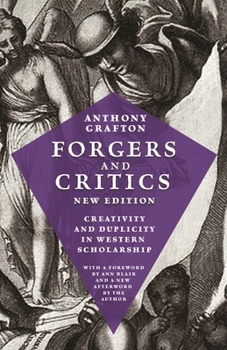Forgers and Critics, New Edition: Creativity and Duplicity in Western Scholarship
Select Format
Select Condition 
Book Overview
The close links between forgery and criticism throughout history
In Forgers and Critics, Anthony Grafton provides a wide-ranging exploration of the links between forgery and scholarship. Labeling forgery the "criminal sibling" of criticism, Grafton describes a panorama of remarkable individuals--forgers from classical Greece through the recent past--who produced a variety of splendid triumphs of learning and style, as well as the scholarly detectives who honed the tools of scholarship in attempts to unmask these skillful fakers. In the process, Grafton discloses the extent, the coherence, and the historical interest of two significant and tightly intertwined strands in the Western intellectual tradition.Format:Paperback
Language:English
ISBN:0691191832
ISBN13:9780691191836
Release Date:April 2019
Publisher:Princeton University Press
Length:192 Pages
Weight:0.77 lbs.
Dimensions:0.6" x 5.5" x 8.4"
Customer Reviews
1 rating
anecdotal
Published by Thriftbooks.com User , 25 years ago
A short book on the history of forged historical documents, and efforts to detect them, from ancient to modern times. It skips around too much, without giving enough context for most of its anecdotes. Part of its larger message is that both practices are age-old, and that the higher criticism of 19c Germany was not as new as it seemed. Also, forgery was always considered wrong; epistemological concepts haven't changed that much. Another message is that the two are intertwined, and even some of the "gravest" opponents and critics of forgery, such as Erasmus, at times were forgers themselves.






